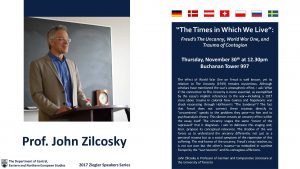Dr. John Zilcosky, University of Toronto will present on “The Times in Which We Live: Freud’s The Uncanny, World War One, and Trauma” on Nov 30th as part of our on-going Ziegler Lecture Series.
The effect of World War One on Freud is well known, yet its relation to The Uncanny (1919) remains mysterious. Although scholars have mentioned the war’s atmospheric effect, I ask: What if the connection to The Uncanny is more essential, as exemplified by the essay’s implicit references to the war—including a 1917 story about trauma in colonial New Guinea and Napoleonic war shock resonating through Hoffmann’s “The Sandman”? The fact that Freud does not connect these traumas directly to “uncanniness” speaks to the problem they pose—to him and to psychoanalytic theory. This silence creates an uncanny effect within the essay itself: The Uncanny stages the same “return of the repressed” that it diagnoses. I aim to delineate this staging and, later, propose its conceptual relevance. The shadow of the war forces us to understand the uncanny differently: not just as a personal trauma but as a social symptom of the repression of this suffering. The real horror of the uncanny, Freud’s essay teaches us, is not our own but the other’s trauma—as embodied in wartime Europe by the “war neurotic” and his contagious afflictions.
John Zilcosky is Professor of German and Comparative Literature at the University of Toronto. His publications include Kafka’s Travels: Exoticism, Colonialism, and the Traffic of Writing (winner of the MLA’s 2003-4 Scaglione Prize for the best book in German Studies), Writing Travel: The Poetics and Politics of the Modern Journey, Uncanny Encounters: Literature, Psychoanalysis, and the End of Alterity, and The Allure and Ethics of Sports from the Ancient Greeks to the Present Day (forthcoming). In addition to these books, Zilcosky has published articles on Kant, Goethe, Kleist, Schopenhauer, Flaubert, Nietzsche, Freud, T. S. Eliot, Hesse, Adorno, Celan, Sebald, Paul Auster, and Botho Strauß. He has won a Humboldt Foundation Research Fellowship (2004-2005), a National Endowment for the Humanities Fellowship (2013-14), and the German government’s Friedrich Wilhelm Bessel Research Award (2018-19).
